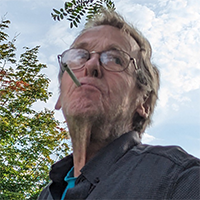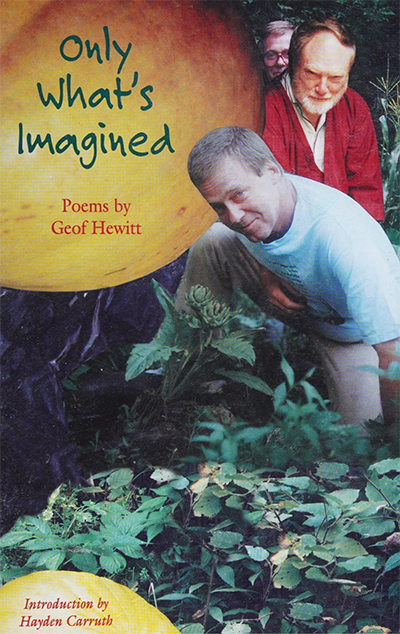 Only What’s Imagined
Only What’s Imagined
 Critique by Jendi Reiter
Critique by Jendi Reiter
Geof Hewitt's meditative poetry collection Only What's Imagined is rooted in the rugged landscape and working-class culture of Vermont. In the book's foreword, National Book Award winning poet and critic Hayden Carruth compares Hewitt to Robert Frost, saying, "His poems are tough, very original, occasionally sentimental, usually keen and caustic." Carruth describes Hewitt's diligent work on behalf of other Vermont writers and literary institutions, a generosity that comes across in the poems' modest but self-assured voice.
My co-judge Ellen LaFleche commented, "He has so much respect for the folks in his town, including working class people. He also observes the mundane; I love that a guy wrote about a clothesline! There's wit and compassion here as well. He writes about his wife and child with loving observation without invading their privacy. As a Vermont non-native, his poetry honors the more taciturn style of many of his Vermont-native workers and friends. Yet I felt so much empathy and emotion filtering through. His poems about the oppression, exhaustion, and low-income issues faced by farm workers and other workers were powerful for me yet so imagistic. I felt their lives and struggles intensely."
Hewitt finds philosophical significance in ordinary things, but wisely doesn't belabor the meaning. In "Blocks", for example, he simply relates how a toy was handed down from his father, to him, to his grandchildren. Putting an entire family history into 16 lines, he tells us so much about a reticent but long-lasting kind of love that expresses itself through actions rather than effusive words.
Similarly, in "The Water", Hewitt demonstrates a country-dweller's wry humility about coexisting with larger forces of nature. "The water was doing what water does best, which is soak things," he begins, appreciating its role in breaking down and building up the land, yet not downplaying how unpleasant it is to be soaked, himself. The poem ends with a transcendent image of him singing as he fights his way home through the rain. What humans do best, Hewitt implies, is to make meaning and beauty despite our helplessness.
As the book was released in 2000, some of the political poems felt a little dated with their references to Reagan, Thatcher, and Gorbachev. I think that this wouldn't have stood out for me so much if the poems had had the same subtlely of tone that his more personal work displayed. Instead there was some lecturing rather than letting the physical observations speak for themselves. But even in the poem "The Terrorists", which epitomized this tendency, he ends with an aphorism for American empire in any era: "And the terror of peace/was known in many lands." So much for the neoliberal "end of history" that we were supposed to have reached in 1999.
The book's interior design was professional, in a large and attractive typeface with good spacing on the page. The back jacket copy was not easy to read because of the small white type on dark green. In general I recommend fewer words on the back cover so that there's room to make the print larger. The cover image of a smiling middle-aged man kneeling in a garden bed of squash had an inviting vibe and cozy earth tones. I would just note that straightforward naturalistic photographs on a poetry book cover come off as "self-published" in comparison to current book design trends. In a genre where many of our entries feel overstuffed, Only What's Imagined was just the right length at 72 pages, with a unified voice.
Read an excerpt from Only What's Imagined (PDF)
To buy this book, please mail cash or check for $15 (includes postage) payable to Geof Hewitt, P.O. Box 51, Calais, VT 05648.








